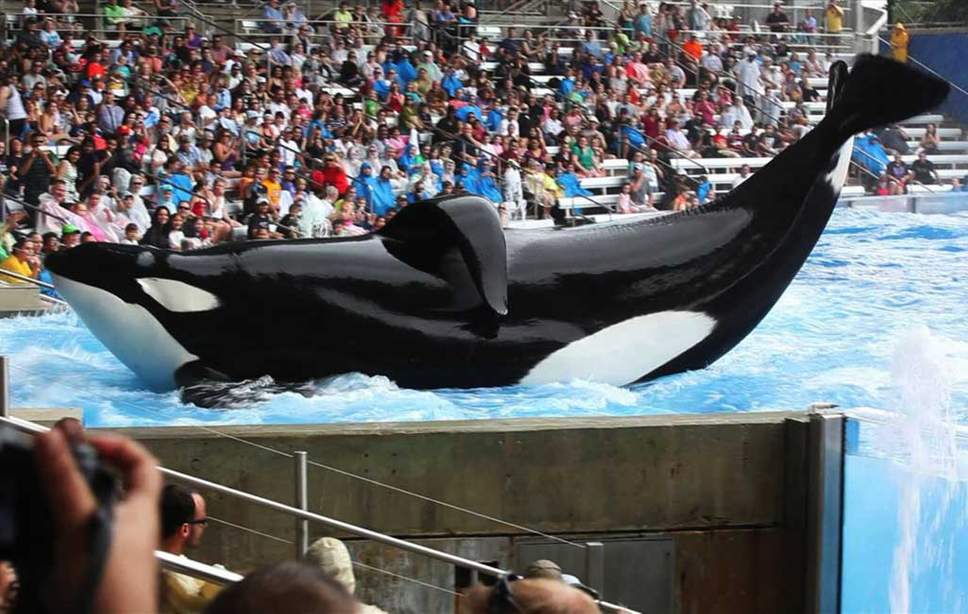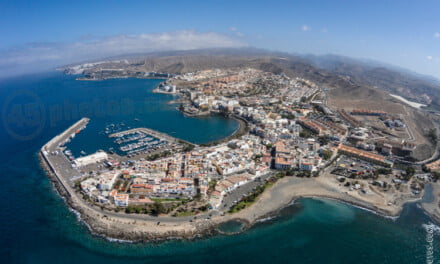Loro Parque, on Tenerife, are one of a dwindling number of tourism attractions around the world that profit from the exhibition of performing captive animals, and who maintain their activities through breeding programs. Many of their animals are forced/trained to perform unnatural “tricks” for the public, so as to receive food, in some places punished for not performing “correctly” and kept in cramped conditions that are distinct and very much smaller than their natural habitats. A recent Canary Islands law could lead to the eventual banning of all such unnatural performances, and tour operators are refusing to sell such excursions, but for now these big businesses still claim they are doing nothing wrong, and only care about the animals’ welfare… animals from whom they also earn a tidy profit.
“Experts” paid by Loro Parque have reaffirmed today that in their opinion it would be “completely impossible” to release in to the sea the killer whales that currently live in concrete tanks at their tourist attraction in Tenerife, and that even their re-homing to a sanctuary would not improve their well-being, in fact they say “just the opposite”.
In a letter responding to the growing tide in criticisms received about the existence of performing orcas at this “zoo” exhibition, Loro Parque have made it clear that these are “hybrid animals” (mixed between orcas from the Atlantic and Pacific oceans) and that no administration of any country would allow them to be released, due to the danger of genetic contamination of wild populations of this species.
This in part sounds like a sane argument
In addition, the park adds that being second, third and fourth generation animals under human care they have never learned to hunt their prey and point out that the only known liberation of such an orca born in freedom and then kept 20 years in a zoo (that of world famous killer whale Keiko, who starred in the movie “Free Willy”) showed that it is not possible for these animals to recover the ability to hunt their own food.
So one famous whale was released, once, and did not fair well. Sounds like a fair basis on which to decide the abilities and needs of an entire species… erm, no wait…!
The health authorities, they say, would not allow the animals to be released into the sea, since it would enable the release of bacteria, fungi and parasites that have been treated with drugs and could cause serious epidemics in dolphins and wild whales, adds the letter from Loro Parque.
Sounds like they have been dealing with some serious ailments in those tiny concrete tanks in which their orcas are forced to live.
In the opinion of the tourist attraction, the best proof of the inability of captive orcas to adapt to life at sea was the release of Keiko, which after more than three years of work and 20 million dollars resulted in the death “of a wonderful animal that was unable to hunt on its own” the park adds.
For almost 46 years, Loro Parque has profited from the exhibiting of many captive animals that, they say, needed help and in the case of killer whales, they named Skyla, Kohana, Tekoa and Keto who joined them in 2006, as well as Adam (born in captivity at the center in 2010) and of course Morgan, the controversial orca “rescued” on the shores of the Wadden Sea in the Netherlands and never re-released, according to the park who acquired her in 2011, as they said she needed their protection due to being “profoundly deaf”. Campaigners say she was illegally purchased and transported for private exploitation. The park have since carried out a successful insemination program to breed more captive orcas who will under law be their exclusive property.
“Today the six orcas that Loro Parque hosts” say the park “are in perfect condition, their health is monitored daily by a team of veterinarians and their needs attended by a group of expert caregivers,” .
 Loro Parque have criticized internationally recognised activist groups, such as PETA (People for the Ethical Treatment of Animals), the Born Free Foundation and the Free Morgan Foundation, that petition various administrations for the release of these animals, or who demand their transfers to marine sanctuaries, saying that they regret that this “pressure” is also transferred to tour operators and tourist companies.
Loro Parque have criticized internationally recognised activist groups, such as PETA (People for the Ethical Treatment of Animals), the Born Free Foundation and the Free Morgan Foundation, that petition various administrations for the release of these animals, or who demand their transfers to marine sanctuaries, saying that they regret that this “pressure” is also transferred to tour operators and tourist companies.
Reputable tour operators, including TUI and Thomas Cook, have refused to sell excursions to their clients if there are to be captive animals forced to perform for their audiences.
The tourist attraction in Tenerife, much mired in controversy over the years, has stated that it is only anti-zoo organisations who claim killer whales are not happy in these centres since, according to their knowledge, there have been no researchers from independent universities with academic knowledge and accredited experience on animal welfare to corroborate these claims.
Tilikum in a scene from ‘Blackfish’
Erm… the link between psychosis, self harm, violent behaviours, depression and illness in captive performing animals, in particular cetaceans like orcas, is pretty well established… there are very specific reasons why companies like Sea World have been in serious trouble and have closed exhibitions over recent years, namely bad practice, public shock and their failure to understand the science, in the name of protecting their own profits. Most famously the film “Blackfish” went a very long way in educating the public on the realities of captive orca exhibitions and the problems with the conditions of their keeping and performance training.
Loro Parque say that the demonstrations and campaigns by these groups are not based on measurements of hormones, rigorous research on behaviour or careful scientific studies evaluating the personality or activity of the animals but instead “prejudices and speculations that have never been proven”.
The Tenerife tourism centre states that they have independent studies from welfare experts from the Autonomous University of Barcelona, the University of Las Palmas de Gran Canaria and the Max Plank Institute that conclude that the welfare of these animals is very high.
For Loro Parque, it is “very naive” to think that killer whales that have been living in zoos for several generations will automatically swim longer distances in sanctuaries just because they are in a larger place.
In the sanctuaries, they say, the nutritional needs of the killer whales would be the same as those of a zoo, that is, they would have to offer them 8 or 9 meals a day, that would represent more than 300 kilos per day of high quality fish and they say that the maintenance of an orca supposes a cost around $600,000 per year, so the sanctuary would need to generate at least $3.6 million each year for the next 40 or 50 years.
“Considering the difficulties that the shelters of dogs and cats have, to maintain much lower costs, it is possible that in a few years these expenses must be paid with the taxes of all citizens,” concludes Loro Parque in its extraordinary statement.
Source: La Provincia
Extra commentary: Editor












